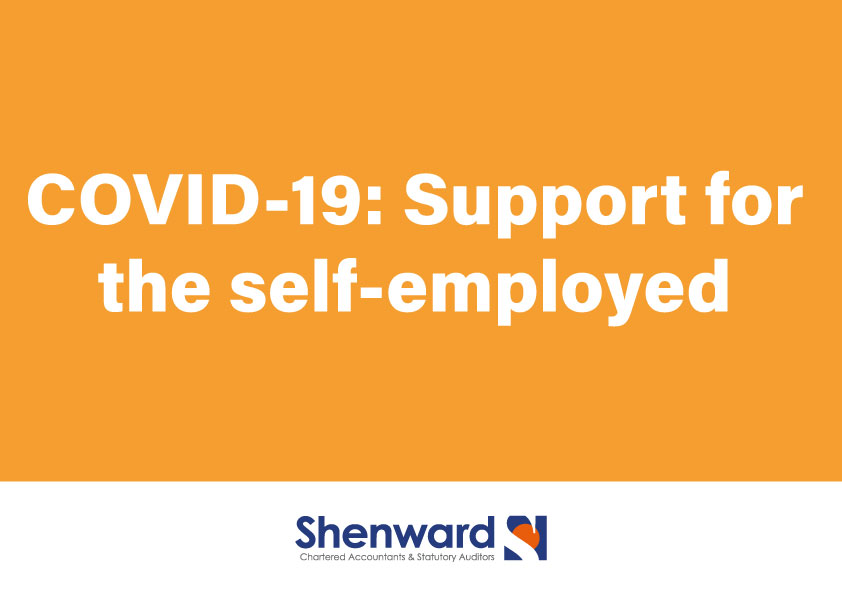Government support during COVID-19 pandemic: Your questions answered
The new coronavirus, officially name COVID-19, was first declared a pandemic by the World Health Organisation on 11TH March 2020, when the number of affected countries and individuals drastically increased.
Given how much the virus has spread across the UK, the stimulus package announced during the 2020 Budget last week is no longer sufficient to deal with the crisis, and so further measures have been put in place to protect businesses across the UK.
The Chancellor confirmed this is the biggest peacetime economic shock the UK has ever faced, and here at Shenward we recognise the disruption many of our clients, associates and the wider business community will be experiencing.
Here we answer some of your most pressing questions in an easily digestible way.
I’m self-employed and can’t claim sick pay, what help can I get?
In the 2020 budget, The Chancellor announced that Employment and Support Allowance (ESA) or Universal Credit would be made available to all those who don’t qualify for Statutory Sick Pay (SSP) from day one should they be unable to work due to self-isolation, with or without symptoms of COVID-19.
The official document states: “For the duration of the outbreak, the requirements of the Universal Credit Minimum Income Floor will be temporarily relaxed for those who have COVID-19 or are self-isolating according to government advice, ensuring self-employed claimants will receive support.
“People will be able to claim Universal Credit and access advance payments upfront without the current requirement to attend a jobcentre if they are advised to self-isolate.”
The current maximum allowance of ESA that can be claimed is £73.10 per week and claims can be made here https://www.gov.uk/employment-support-allowance/how-to-claim.
HMRC has also set up a dedicated helpline for all those who are concerned about paying their upcoming tax bills due to the COVID-19 pandemic.
If I have to self-isolate, am I entitled to Statutory Sick Pay?
During the 2020 Budget, The Chancellor advised that all those who are advised to self-isolate, with or without symptoms will be entitled to Statutory Sick Pay from their employers from day one if they are employed.
The current rate of SSP is £94.25 per week and will be paid to you via your usual payment method in line with your usual payment terms.
I’m an employer, can I claim back the SSP I have had to pay out to those self-isolating?
During the budget, The Chancellor announced that firms with under 250 employees will be able to claim back SSP paid due to COVID-19, for up to 14 days per employee.
Whilst employees aren’t required to provide a GP sick note, employers who wish to reclaim the SSP should make a note of all COVID-19 related absences including date and length of time.
HMRC has advised that they will work with employers over the coming months to allow them to reclaim these funds.
I’m a small firm experiencing financial disruption due to COVID-19. What financial support is available for just small firms?
Last week during the budget, it was announced that small firms would be able to access business interruption loans throughout the pandemic.
The Coronavirus Business Interruption Loan Scheme is to support long-term viable businesses who may need to respond to cash-flow pressures by seeking additional finance. This will be made available via the British Business Bank.
Official advice states: “The government will provide lenders with a guarantee of 80% on each loan (subject to a per-lender cap on claims) to give lenders further confidence in continuing to provide finance to SMEs. The government will not charge businesses or banks for this guarantee, and the Scheme will support loans of up to £5 million in value. Businesses can access the first 6 months of that finance interest free, as government will cover the first 6 months of interest payments.”
The Budget announced last week also said that £3,000 grants would be made available to the 700,000 of our smallest businesses. To support their cash flow, grants have now increased to £10,000.
What other financial support was announced in the COVID-19 press conference on 17th March?
The Chancellor has confirmed that any business who needs access to cash will be able to access a government-backed loan, on attractive terms. Whilst he has set aside a huge £330bn, if demand is greater than the initial £330bn, the government will provide as much capacity as required.
In the Budget announced last week, it was suggested that businesses in the retail, hospitality and leisure sectors, with a rateable value of less than £51,000, will pay no business rates this year. Due to recent non-essential contact advice, those businesses are now also entitled to an additional cash grant of up to £25,000 per business. Also, every single business in the retail, hospitality or leisure sector will pay no business rates whatsoever for 12 months.
Lastly, for those in difficulty due to coronavirus, mortgage lenders will now offer a three-month mortgage holiday meaning that people will not have to pay a penny towards their mortgage until they get back on their feet.
The government has left the ‘door open’ and it appears that further announcements may be made if required. The total stimulus package is over £300bn which equates to 15% of GDP. We’re used to see percentage points of measures introduced, so 15% is huge.
Here at Shenward, we welcome the government’s intention to show intent, but feel there are some questions unanswered.
How are renters to be protected?
Will businesses be able to access grants and loans as set out above in time before they have to temporarily or permanently close. Liquidity in the SME sector is already running on reserve and they cannot last for much longer.
Looking at how the grants can be accessed; it looks like it will take 6-8 weeks for businesses to get hold of it. The grants are to be redistributed through the Local Authority and it’s not clear when.
Further information about any of the above can be accessed via:
https://www.gov.uk/government/news/coronavirus-covid-19-guidance-for-employees-employers-and-businesses
https://www.gov.uk/government/speeches/chancellor-of-the-exchequer-rishi-sunak-on-covid19-response






